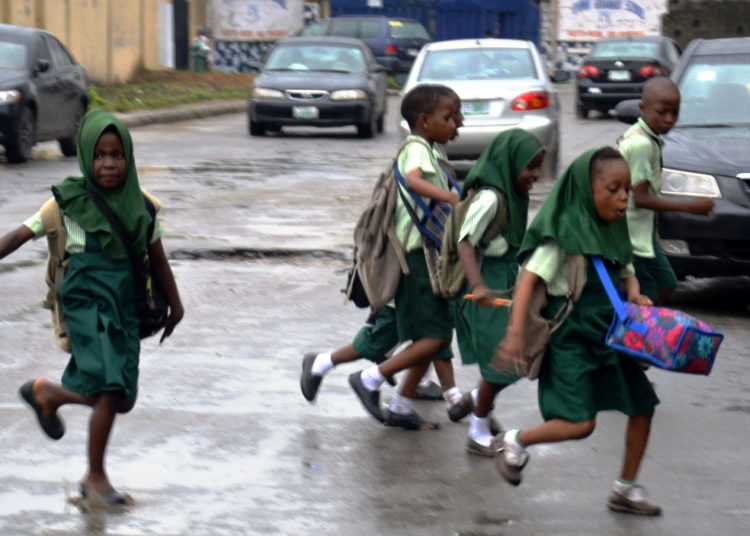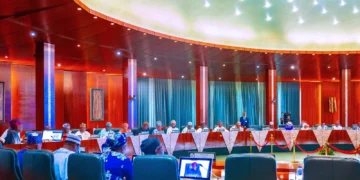Apart from the rich, most parents are finding it difficult to pay for the standard and quality of education they desire for their children
Things are hard for everyone, but they are certainly tougher right now for parents whose wards are set to resume school.
As the new academic session dawns, many parents are facing an uphill battle of finding funds for their children’s education amidst a potpourri of economic challenges.
The staggering inflation rate of 23 percent plus, which has led to the skyrocketing of costs of living has virtually emptied the pockets of most parents. This inflation has led to a steep rise in the cost of books, learning aids, and transport cost for pupils.
Then, there is the increase in school fees by private schools due to high cost of running these schools (payment of salaries, multiple taxation by federal, state and local governments, high cost of diesel to power generators etc.) has created a perfect storm of financial hardship for every Nigerian family that has a school age child.
While parents are striving to secure a bright future for their children through quality education, the economy appears bent on frustrating the laudable intention of many parents!
A sampling across the country shows that many parents are in despair. Apart from the rich, most parents are finding it difficult to pay for the standard and quality of education they desire for their children.
Granted that public Schools are virtually free in many states, the fact remains that most public schools are little more than school-time wasters.
3-Day Work Week In Some States
The situation in public schools is worsened by the fact that many states have taken to the ill-conceived idea of 3-day working week for their employees and civil servants. This nomenclature includes teachers. One wonders what children can learn in a 3-day teaching week. Clearly, any parent who wants the best for his wards and can afford it should distance himself from such 3-day school week arrangement!
Knowledge Driven World
The world is currently a knowledge driven world, many countries particularly in Asia consider the 5-day school week as inadequate for the proper education of their children. Unfortunately, many states are plunging their young into worse economic straits with this 3-day school week. One wonders what can be taught or learnt in 3 days? This column urges those states that have adopted a 3-day school week to immediately drop the idea as it bodes no good for the education of their people.
The primary concern of parents today across Nigeria is the crippling cost of feeding and educating their children. With the steep fall in the value of the naira, the purchasing power of the average Nigerian has diminished quite significantly. Basic essential commodities, from food to shelter, have become increasingly unaffordable, leaving parents with limited resources to allocate towards their children’s education.
Inflation is eroding savings and pushing families further into debt and poverty. This is worsened by the fact that many parents who are into small scale businesses are finding it difficult to make ends meet as a result of the removal of fuel subsidy by the administration of President Bola Ahmed Tinubu. This high fuel factor alone has crippled these small businesses that rely mostly on petrol powered generators and engines.
Obviously, the expenses associated with sending a child to school extend beyond tuition fees. The exorbitant cost of textbooks, stationery, uniforms, and other educational aids presents an additional burden on parents.
These costs collectively place an enormous strain on household budgets. Many parents are compelled to resort to second-hand items, which may not be up-to-date or in the best condition.
Private Schools In Nigeria Private schools in Nigeria, once considered an alternative to the overburdened public education system, have not been immune to the economic challenges facing the country. To keep within acceptable standards, private school owners are often left with no choice but to increase school fees. While this may be a necessary measure to ensure school standards, it further exacerbates the financial burden on parents.
The relentless cycle of rising fees puts quality education out of reach for many families who have already been stretched thin by the relentless inflation and high cost of living.
Parents are then left with a painful dilemma: either find a way to bear the financial strain and continue to invest in their children’s education, or withdraw them from private schools to the overburdened public schools thus compromising their children’s academic prospects.
The vast majority of Nigerian parents earn meager incomes that fall far short of meeting their family’s needs, let alone supporting their children’s education.
A significant number of parents are trapped in low-paying jobs with minimal job security, so they are unable to provide the educational opportunities they desire for their children. The situation is particularly dire for single parents, who must shoulder the entire financial burden alone. The struggle to balance work, parenthood, and education weighs heavily on their shoulders, often pushing them to the brink of exhaustion and despair.
Governments should consider subsidizing the cost of textbooks, stationery, and other educational materials to alleviate the financial burden on parents. Government should also introduce targeted education support programmes that provide financial assistance to families struggling to meet their children’s education needs.
Such a policy will ensure that many kids do not drop out of school prematurely. It is necessary that governments develop a policy that supports private schools financially. After all, these private schools educate Nigerians and without them, Nigerian education landscape will be in utter desolation.
Scholarship And Flexible Payment Plans
While we recognize the need for private schools to cover their expenses, the government should introduce measures to cap and regulate the frequency of fee increases, thus ensuring that quality education remains accessible to a wider range of families.
The government should also prioritize investment in public education, improving the quality and accessibility of schools across the country. This would reduce the reliance on private schools and create a more equitable educational system.
Private schools can help their bright pupils by establishing scholarship and financial aid programmes to assist deserving students from financially disadvantaged backgrounds.
Both public and private schools should implement flexible payment plans that ease the burden on parents by allowing them to pay fees in installments.
Installment payment is very necessary at this point due to the precarious high cost of living as many families are living from hand to mouth. They may find it difficult to save and accumulate the lump sums required for one-time payment.
Need For Comprehensive School Reform
The challenges parents in Nigeria face as schools resume are a stark reminder of the urgent need for comprehensive reforms in the country’s education and economic sectors. The confluence of high living costs, rampant inflation, expensive educational materials, rising private school fees, and inadequate incomes is pushing parents to the brink. The government and private school owners must come together to find sustainable solutions that prioritize quality education and ease the financial strain on Nigerian families.
Education is the bedrock of a nation’s progress, and it is imperative that no child is left behind due to economic hardships beyond their control.
Only through such concerted efforts can we hope to build a stronger, more equitable educational system that empowers the next generation of leaders and innovators.
MAY NIGERIA REBOUND





